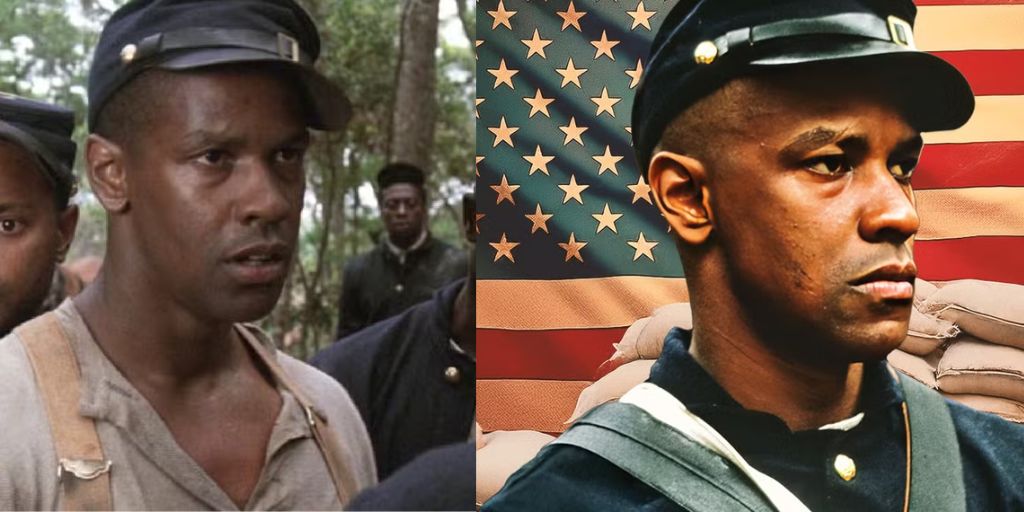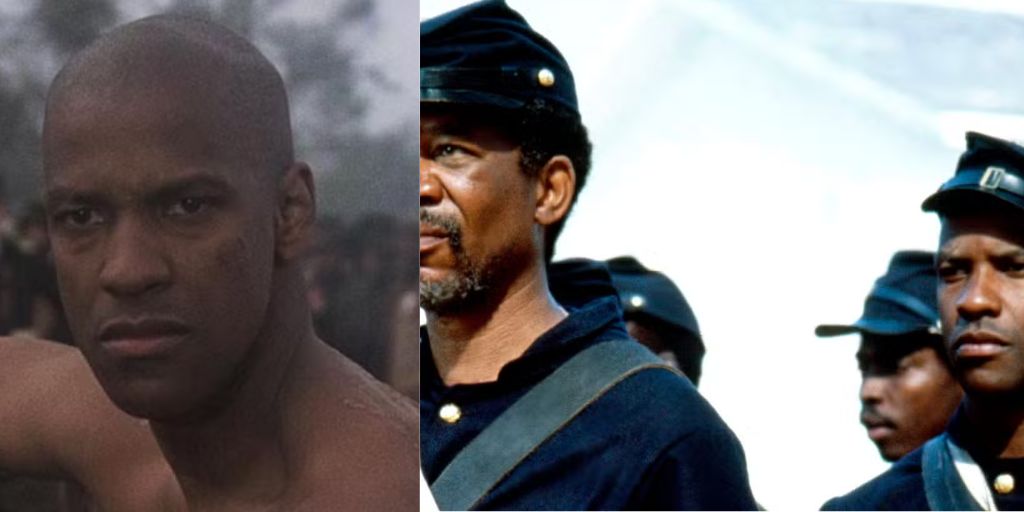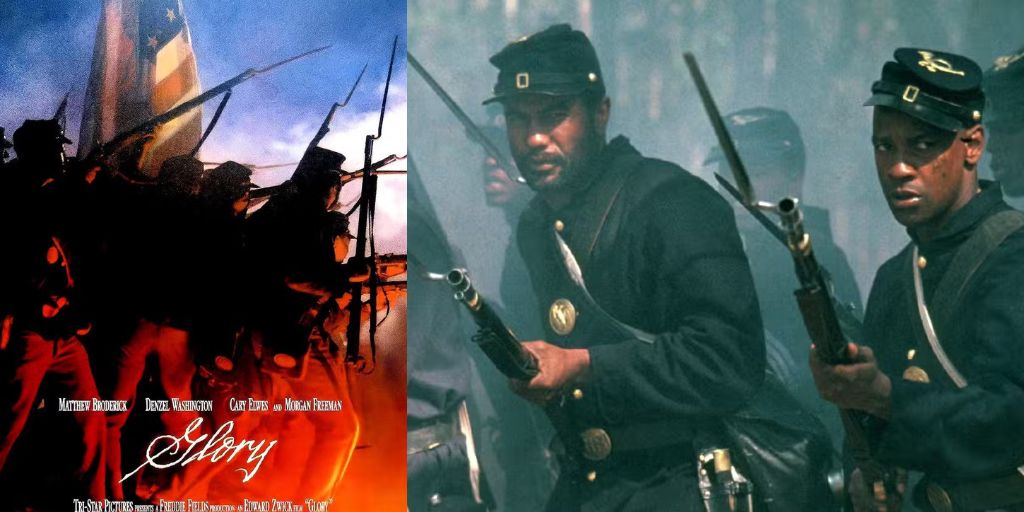When compared to major events like World War II and the Vietnam War, fewer movies focus on the American Civil War. This could be because the Civil War did not attract as many viewers from other countries. Additionally, the conflict had some very ugly motivations that make it harder to portray.
Showing slavery in films can be difficult, as filmmakers must treat the topic with great sensitivity and respect. It is tough to find something positive in such a dark time in history. However, the powerful Civil War movie Glory brought an important true story to life. This film helped Denzel Washington win his first Academy Award for Best Supporting Actor.
Glory is based on the true bravery of the 54th Massachusetts Infantry Regiment. This group became one of the first all-Black divisions in the Union Army during the Civil War. The regiment was commanded by Captain Robert Gould Shaw, played by Matthew Broderick. Shaw’s job was to train the new soldiers, including John Rawlins (Morgan Freeman), Jupiter Sharts (Jihmi Kennedy), Silas Trip (Washington), and Thomas Searles (Andre Braugher).
Shaw motivates the soldiers by informing them that the Confederacy plans to execute any Black men who try to escape slavery in response to President Abraham Lincoln’s Emancipation Proclamation. Despite this motivation, Trip begins to feel uncertain about his service. He struggles with the idea of supporting a country that does not see him as a citizen and does not allow him to vote.
Glory is known for some of the most impressive Civil War battle scenes in film history. This is largely due to the talent of director Edward Zwick. While Zwick may not be as famous as directors like Martin Scorsese or Quentin Tarantino, he has a special ability to showcase real-life conflicts dramatically. He later directed movies like Legends of the Fall and The Last Samurai.

Glory effectively shows the harshness of the Civil War. The invention of new types of ammunition meant that battles lasted for many days, which was tough for soldiers in the 54th Regiment. These soldiers received fewer resources and supplies compared to white divisions.
The film highlights the complex experiences of Black soldiers during the Civil War and does not shy away from addressing the racism that the 54th Regiment faced. Even soldiers like Shaw, who believe they are honorable, still see the Black men under their command as lesser citizens. They can never fully understand the suffering that these men have experienced.
The film does an excellent job of illustrating the different perspectives within the Black experience. For example, Searles is a free man who feels a stronger loyalty to Shaw. In contrast, Trip is more skeptical and even refuses to carry the regiment’s flag at first because he is upset about how former enslaved people are treated.
A heartbreaking scene shows Trip getting flogged for what seems like an attempt to desert, which is one of the most disturbing moments in war films. Despite its strengths, Glory has received some criticism. For instance, film critic Roger Ebert pointed out the problem of using a white protagonist, Shaw, as the main focus of the story.
Additionally, some viewers might find it hard to feel inspired by the movie’s ending. While there is a powerful moment when Trip rallies his fellow soldiers during a battle, the film does not address the harsh treatment that many Black men who fought for the Union faced after the war ended.
Still, Glory marked a significant turning point in Washington’s career. He had already received praise for his role in Cry Freedom, but Glory established him as a major star of his generation.
The story of Glory goes beyond just the characters and their experiences in battle. It serves as a reminder of the struggles faced by Black soldiers during the Civil War and the ongoing issues of racism and injustice. The film highlights how the heroes of the 54th Massachusetts Infantry Regiment bravely fought for a country that often treated them poorly.
The struggles of soldiers like Trip and Searles are central to the film’s message. They show how the fight for freedom and equality was not just about the battles they faced on the battlefield but also about the recognition and respect they deserved as individuals. The film brings to light the sacrifices made by these men and the difficult choices they had to make.
In the context of history, Glory plays an essential role in representing the contributions of Black soldiers. It helps viewers understand that their participation in the Civil War was significant in shaping the future of the United States. The bravery and resilience shown by the 54th Massachusetts Infantry Regiment are honored through the film’s storytelling.
While some critics question the film’s perspective, many agree that it effectively portrays the emotional and physical challenges faced by Black soldiers. The combination of thrilling battle scenes and deep character development makes Glory a standout film in the war genre.
The cinematography and score enhance the movie’s impact, immersing viewers in the Civil War experience. The film’s attention to detail, from the uniforms to the weaponry, helps create a realistic portrayal of the era. These elements combined with powerful performances from the cast bring the story to life.

The relationship between Shaw and his men is important to the narrative. Shaw’s initial naivety transforms as he learns more about the realities his soldiers face. He begins to recognize their struggles and the importance of their fight for freedom. This character development adds depth to the film, showcasing how understanding and empathy can grow through shared experiences.
The moments of camaraderie and friendship between the soldiers provide a counterbalance to the harshness of war. They show that even in the midst of conflict, strong bonds can form. These relationships emphasize the importance of community and support during difficult times.
Glory also examines the theme of honor in battle. The characters grapple with what it means to fight for a country that does not honor them. This moral conflict is especially poignant for Trip, who struggles with the notion of loyalty and sacrifice. His journey throughout the film highlights the personal battles soldiers face alongside the physical ones.
In the end, Glory stands as a powerful reminder of the sacrifices made by Black soldiers in the fight for freedom. The film shines a light on their courage, resilience, and the ongoing struggle for equality. By telling this important story, Glory helps to ensure that the legacy of the 54th Massachusetts Infantry Regiment is not forgotten.
As Glory continues to be recognized and celebrated, it serves as a source of inspiration for future generations. The film encourages viewers to reflect on the past while considering the ongoing challenges related to race and equality in society today. The stories of courage and determination from the soldiers of the 54th Regiment remain relevant as we continue to strive for justice and understanding.
Glory is more than just a war movie; it is a vital piece of history that captures the spirit of an important moment in the fight for freedom. The film’s powerful storytelling, emotional depth, and historical significance make it a must-see for anyone interested in the complexities of the Civil War and the role of Black soldiers in American history.
Through its engaging narrative and unforgettable characters, Glory leaves a lasting impact on its audience, encouraging reflection and discussion about the past and its relevance today.
Glory serves as a profound coverage of the sacrifices and struggles faced by Black soldiers during the American Civil War. By telling the true story of the 54th Massachusetts Infantry Regiment, the film not only honors their bravery but also sheds light on the complexities of their experiences.
It captures the dual fight these soldiers faced: the physical battles on the battlefield and the emotional turmoil of fighting for a country that often did not recognize their humanity or worth.
The film’s portrayal of Captain Robert Gould Shaw’s growing understanding of his men underscores the importance of empathy and awareness in leadership. Shaw’s journey reflects the broader societal challenges of recognizing and respecting the contributions of marginalized groups.
Through powerful performances, particularly by Denzel Washington, the film evokes deep emotions and invites viewers to reflect on the ongoing issues of race and equality in America.
Moreover, Glory plays a critical role in educating audiences about the significant contributions of Black soldiers in shaping U.S. history. It challenges viewers to confront the painful realities of racism and injustice that persisted during the Civil War and continue to resonate today.
The film serves not just as a reminder of past injustices but also as a call to action, urging society to acknowledge and rectify historical wrongs. Glory is more than just a war film; it is a poignant narrative that emphasizes the need for recognition, respect, and understanding of the sacrifices made by Black soldiers.
As we reflect on their courage, we are reminded of our responsibility to continue advocating for equality and justice. The film’s legacy endures as it inspires future generations to engage with history and strive for a better, more inclusive society.



